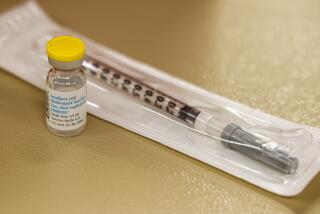Health Unit Would Notify AIDS Victims’ Sex Partners
WASHINGTON — The Assn. of State and Territorial Health Officials will propose a series of far-reaching recommendations to curtail the AIDS epidemic, including recording the names of infected individuals and notifying their sexual contacts, The Times has learned.
The recommendations of the organization go beyond those released by the federal Public Health Service and oppose the position taken by the U.S. Conference of Local Health Officers.
Although its recommendations do not have the force of law, the organization’s members--the top health officers of every state--have the authority to implement most public health policy in their individual states.
Criticism Expected
The guidelines are expected to draw substantial criticism from homosexual and civil rights groups, which oppose reporting the names of people with AIDS or of those infected with HTLV-III, the virus that causes the fatal illness.
The document calls gathering data to determine the extent of infection “fundamental to the control and prevention of disease” and encourages state and local public health agencies to develop systems that encourage the use of the AIDS antibody blood test on a voluntary basis to identify “those persons who are infected and thus potentially infectious.”
The recommendations suggest also that contact notification be used as a way of “discreetly informing persons who may have been recently exposed, either sexually or by sharing needles, to someone who is HTLV-III antibody positive.”
Dr. Alvin Novick, president of the American Assn. of Physicians for Human Rights, warned that many of the proposals could have “seriously damaging consequences that are totally unrelated to public health goals.”
“We have to assess with the greatest possible caution what the consequences will be of any public health measure, since all public health measures, to some extent, conflict with personal liberties,” he said.
But Kristine M. Gebbie, administrator of the Oregon State Health Division and head of the committee that drafted the recommendations, said that opponents are “overreacting” and had failed to recognize that the proposals are only “a framework--a suggestion.”
Local Attitudes a Factor
“We urge anybody attempting to use them to take into account the local attitudes of the high-risk groups in their communities,” she said.
After emphasizing the public health community’s “long-time history” of keeping records confidential, she added: “These are not radical new things.”
The federal Public Health Service has said in its guidelines only that members of groups at risk of developing AIDS should voluntarily undergo the antibody test, which determines only whether an individual has been exposed to the virus. The U.S. Conference of Local Health Officers opposes reporting of test results “except in the context of epidemiological study” and makes no mention of contact tracing.
The state health officers’ recommendations note that contact notification has been widely used to control other infectious diseases and has been shown to be effective “in situations where a treatment and cure can be offered.”
Although it concedes that treatment is not available for AIDS, the report proposes that notification be used to educate those who may have been exposed on ways to prevent further infection to themselves or transmission to others. As of Monday, there were 20,766 AIDS cases and 11,384 deaths.
Strict Confidentiality
The recommendations emphasize strict confidentiality of recorded patient information and ask that state and local health agencies ensure that “safeguards are in place to preclude the inappropriate release of information, particularly personal identifying information.”
However, the document opposes the concept of “anonymous” testing, the condition supported by gay rights groups.
“Although anonymity may still be a necessary option to consider for selected high-risk groups, it is not compatible with optimal surveillance (gathering of data) and should be avoided as a general rule,” the report says.
Jeff Levi, executive director of the National Gay Task Force, predicted that the recommendations would be self-defeating and only discourage high-risk individuals from taking the test. “There is a justifiable fear in the gay community that any system that collects names can be abused,” Levi said.
Anonymous Testing
Novick said that anonymous testing, on the other hand, would “allow people to change their behavior but protect them from inappropriate social punishment by careless or malicious revelation of their identity.”
Gebbie said that the recommendations are not intended “to encourage large numbers of the gay community to be tested,” adding: “For the gay community, the biggest issue is education.
“We want to encourage testing at the edges of that community--at people who do not identify themselves as being at risk,” she said.
Among them, she said, are “the occasional participant in gay sex who doesn’t label it as a life style or the marital partner of a bisexual man, or the suburban housewife whose husband takes a lot of business trips and could have been with prostitutes or having gay encounters.”
More to Read
Sign up for Essential California
The most important California stories and recommendations in your inbox every morning.
You may occasionally receive promotional content from the Los Angeles Times.










